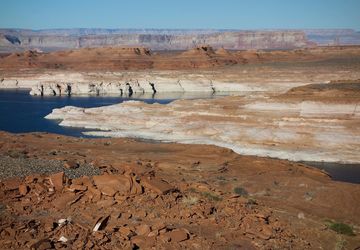Serena Turner catches a large brown trout during a fish salvage for the Deschutes Land Trust.
Serena Turner (she/her)
Hometown: Phoenix, AZ
Major: Symbolic Systems ‘25
Internship: Deschutes Land Trust
Serena Turner recounts her experience at a fish salvage restoration project
Growing up, I always loved the outdoors and considered myself an adventurous person. However, turns out, the adventures in Phoenix, Arizona are quite different from those in Central Oregon! I came into this internship with little specialized knowledge in conservation and restoration practices, but with a deeply felt responsibility to care for the land and an eager mind, I am ready to dive into anything.
That’s why, in an effort to fully immerse myself, I have been tagging along with my Deschutes Land Trust coworkers on their field expeditions. Recently, I helped with a fish rescue that was part of the stream restoration work at Rimrock Ranch.
The morning of the rescue, I wake up excited to contribute to the restoration effort. When we arrive at Rimrock Ranch, I find myself surrounded by members of lots of organizations and agencies, including the U.S. Fish and Wildlife Service, the U.S. Forest Service, and the Oregon Department of Fish and Wildlife. Coming in as an intern, I was initially intimidated by their titles, extensive backgrounds, and knowledge in their respective fields. Back at Stanford, I learned about these organizations in lectures and readings, but I had yet to interact with them outside the classroom.
As we all gather around the vehicles, preparing our gear for the day, I question whether I wore the right clothes and brought all the necessary equipment. I feel slightly out of place in this new environment, yet nonetheless excited for today’s new experience. In order to help rescue the fish, I would have to wade in Whychus Creek and so my coworker graciously brought an extra set of wading boots and waders for me to borrow. Knowing little about this waterproof gear, I start putting on the boots before the waders. Little do I know, this is a rookie mistake, signaling my novice status! Thankfully, my coworkers, smiling at my inexperience, help me correct this mix-up and get my gear in order.
After everyone is ready, we receive an extensive safety talk and plan for the day. I am amazed at the precautions taken and the level of organization for this restoration project. As everyone breaks, confidently moving to their role, I attempt to follow along. I see there is much to learn.
Though I initially felt out of place among these seasoned professionals, my assigned small group takes me under their wing. They recognize that it is my first fish rescue and that I am still learning about the fish we will find in Whychus Creek. Getting into the river, they help me navigate these new heavy boots in the water and teach me the best positioning and technique. During the day, I learn how to identify different fish, the reasoning behind the restoration work on Whychus Creek, and tricks on how to safely relocate the fish.
By the end of the day, my foreign feelings have subsided as I am more confident in my fish tactics and ability to interact with all the fish rescue professionals. I feel more natural in this setting and among this crowd. By dipping my toes in the water and learning the intricacies of the project, I acclimate to my lively new environment.
Reprinted with permission from Deschutes Land Trust.



